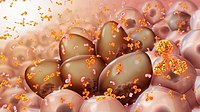
Response to “The Role of FcRn in the Pharmacokinetics of Biologics in Patients with Multiple Myeloma”
Sign Up to like & getrecommendations! Published in 2017 at "Clinical Pharmacology and Therapeutics"
DOI: 10.1002/cpt.779
Abstract: To the Editor: Daratumumab, a therapeutic immunoglobulin G (IgG) 1j monoclonal antibody, targets CD38 for the treatment of multiple myeloma. In our article, we reported that daratumumab exhibited time-dependent and concentration-dependent pharmacokinetics (PK) consistent with… read more here.
Keywords: igg; response; multiple myeloma; igg patients ... See more keywords

Neonatal Fc receptor blockade as emerging therapy in diseases with plasma exchange indications.
Sign Up to like & getrecommendations! Published in 2023 at "Journal of clinical apheresis"
DOI: 10.1002/jca.22055
Abstract: Neonatal Fc receptor (FcRn) blockade may represent a mechanism similar to plasma exchange (PLEX) in reducing immunoglobulin levels and thus have a broad implication for apheresis practitioners. Although only efgartigimod received FDA approval for myasthenia… read more here.
Keywords: neonatal receptor; fcrn; receptor blockade; plasma exchange ... See more keywords

Minimal physiologically‐based pharmacokinetic model to investigate the effect of pH dependent FcRn affinity and the endothelial endocytosis on the pharmacokinetics of anti‐VEGF humanized IgG1 antibody in cynomolgus monkey
Sign Up to like & getrecommendations! Published in 2018 at "European Journal of Pharmaceutical Sciences"
DOI: 10.1016/j.ejps.2018.09.015
Abstract: &NA; In this study, we developed a first minimal physiologically‐based pharmacokinetic (mPBPK) model to investigate the complex interaction effects of endocytosis rate/FcRn binding affinity at both acidic/physiological pH on the pharmacokinetics (PK) of the anti‐VEGF… read more here.
Keywords: anti vegf; igg1; model; fcrn ... See more keywords

Application of Physiologically Based Pharmacokinetic Modeling to Predict the Effects of FcRn Inhibitors in Mice, Rats, and Monkeys.
Sign Up to like & getrecommendations! Published in 2019 at "Journal of pharmaceutical sciences"
DOI: 10.1016/j.xphs.2018.10.065
Abstract: There is a growing interest in developing inhibitors of the neonatal Fc-receptor, FcRn, for use in the treatment for humoral autoimmune conditions. We have developed a new physiologically based pharmacokinetic model that is capable of… read more here.
Keywords: based pharmacokinetic; mice rats; anti fcrn; physiologically based ... See more keywords

Short FcRn-Binding Peptides Enable Salvage and Transcytosis of scFv Antibody Fragments.
Sign Up to like & getrecommendations! Published in 2022 at "ACS chemical biology"
DOI: 10.1021/acschembio.1c00862
Abstract: Therapeutic antibodies have become one of the most widely used classes of biotherapeutics due to their unique antigen specificity and their ability to be engineered against diverse disease targets. There is significant interest in utilizing… read more here.
Keywords: size; fcrn; short fcrn; fcrn binding ... See more keywords

Human cytomegalovirus evades antibody-mediated immunity through endoplasmic reticulum-associated degradation of the FcRn receptor
Sign Up to like & getrecommendations! Published in 2019 at "Nature Communications"
DOI: 10.1038/s41467-019-10865-y
Abstract: Human cytomegalovirus (HCMV) can persistently infect humans, but how HCMV avoids humoral immunity is not clear. The neonatal Fc receptor (FcRn) controls IgG transport from the mother to the fetus and prolongs IgG half-life. Here… read more here.
Keywords: degradation; endoplasmic reticulum; human cytomegalovirus; fcrn ... See more keywords

Consideration of C1q and FcRn binding to allotypically disparate IgG3 could aid in engineering more efficacious anti-SARS-CoV-2 mAbs
Sign Up to like & getrecommendations! Published in 2023 at "Proceedings of the National Academy of Sciences of the United States of America"
DOI: 10.1073/pnas.2306078120
Abstract: Izadi et al. (1) have added to the increasing body of evidence that IgG3 monoclonal antibodies (mAbs) are more potent than their IgG1 counterparts in mediating Fc-mediated effector functions. They also show that immunoglobulin constant… read more here.
Keywords: fcrn binding; immunology; half life; fcrn ... See more keywords

Targeting the neonatal Fc receptor (FcRn) to treat autoimmune diseases and maternal‐fetal immune cytopenias
Sign Up to like & getrecommendations! Published in 2021 at "Transfusion"
DOI: 10.1111/trf.16341
Abstract: FcRn, a non‐classical Fc gamma (γ) receptor (FcγR) with near ubiquitous expression, plays key roles in disease pathogenesis and progression though immunoglobulin G (IgG) transport, IgG recycling, and IgG‐immune complex clearance. FcRn function can be… read more here.
Keywords: immune; autoimmune diseases; diseases maternal; fcrn ... See more keywords

FcRn augments induction of tissue factor activity by IgG-containing immune complexes.
Sign Up to like & getrecommendations! Published in 2020 at "Blood"
DOI: 10.1182/blood.2019001133
Abstract: Thromboembolism complicates disorders caused by IgG-containing immune complexes (ICs), but the underlying mechanisms are incompletely understood. Prior evidence indicates that induction of tissue factor (TF) on monocytes, a pivotal step in the initiation, localization and… read more here.
Keywords: factor activity; factor; fcrn; igg containing ... See more keywords

Loss of expression of the recycling receptor, FcRn, promotes tumor cell growth by increasing albumin consumption
Sign Up to like & getrecommendations! Published in 2017 at "Oncotarget"
DOI: 10.18632/oncotarget.13869
Abstract: Tumor cells rely on high concentrations of amino acids to support their growth and proliferation. Although increased macropinocytic uptake and lysosomal degradation of the most abundant serum protein, albumin, in Ras-transformed cells can meet these… read more here.
Keywords: tumor cell; fcrn; receptor; growth ... See more keywords

The neonatal Fc receptor expression during macrophage differentiation is related to autophagy
Sign Up to like & getrecommendations! Published in 2022 at "Frontiers in Immunology"
DOI: 10.3389/fimmu.2022.1054425
Abstract: The neonatal Fc receptor (FcRn) plays a central role in recycling and biodistributing immunoglobulin G. FcRn is also involved in many physiological immune functions as well as pathological immune responses in cancer or autoimmune diseases.… read more here.
Keywords: neonatal receptor; expression; anti inflammatory; fcrn ... See more keywords